|
|
|
Sort Order |
|
|
|
Items / Page
|
|
|
|
|
|
|
| Srl | Item |
| 1 |
ID:
092136
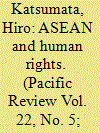

|
|
|
|
|
| Publication |
2009.
|
| Summary/Abstract |
Observers of Southeast Asian affairs commonly assume that the members of the Association of Southeast Asian Nations (ASEAN) are reluctant to pursue liberal agendas, and that their main concern is to resist pressure from Western powers to improve their human rights practice. This article, however, argues that such a conventional view is too simplistic. The Southeast Asian countries have voluntarily been pursuing liberal agendas, and their main concern here is to be identified as 'Western' countries - advanced countries with legitimate international status. They have 'mimetically' been adopting the norm of human rights which is championed by the advanced industrialized democracies, with the intention of securing ASEAN's identity as a legitimate institution in the community of modern states. Ultimately, they have been pursuing liberal agendas, for the same reason as cash-strapped developing countries have luxurious national airlines and newly-independent countries institute national flags. Yet it should be noted that the progress of ASEAN's liberal reform has been modest. A conventional strategy for facilitating this reform would be to put more pressure on the members of ASEAN; however, the usefulness of such a strategy is diminishing. The development of an East Asian community, the core component of which is the ASEAN-China concord, makes it difficult for the Western powers to exercise influence over the Southeast Asian countries. Hence, as an alternative strategy, this article proposes that ASEAN's external partners should 'globalize' the issue of its liberal reform, by openly assessing its human rights record in global settings, with the aim of boosting the concern of its members for ASEAN's international standing.
|
|
|
|
|
|
|
|
|
|
|
|
|
|
|
|
| 2 |
ID:
092137
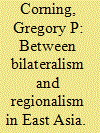

|
|
|
|
|
| Publication |
2009.
|
| Summary/Abstract |
This paper examines economic regionalism in East Asia with a focus on the key issues in harmonizing bilateral free trade agreements. The ASEAN+1 free trade agreements with China, South Korea and Japan represent the first attempts to structure cooperation in trade across Southeast and Northeast Asia. It is therefore important to examine the coverage of these agreements and the extent to which they actually liberalize trade. This study focuses on major choices made in the negotiation of the ASEAN-Japan Comprehensive Economic Partnership Agreement and the ways in which these choices help or hinder the consolidation of economic regionalism. The results achieved in the ASEAN-Japan Comprehensive Economic Partnership Agreement are limited at best. The agreement does establish some new areas of cooperation among the signatories but fails to address important issues for regionalism such as labor mobility. It also makes limited progress in harmonizing and liberalizing rules of origin. The ASEAN-Japan Comprehensive Economic Partnership Agreement applies product-specific rules to fewer categories of goods than most of Japan's bilateral agreements with ASEAN members but those rules in place are still very restrictive. Moreover, the parties to the ASEAN-Japan Comprehensive Economic Partnership Agreement have the option of applying the rules of their bilateral agreement if it provides more favorable treatment. Thus, there is no guarantee the more liberal terms of the ASEAN-Japan Comprehensive Economic Partnership Agreement will be applied.
|
|
|
|
|
|
|
|
|
|
|
|
|
|
|
|
| 3 |
ID:
092138
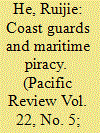

|
|
|
|
|
| Publication |
2009.
|
| Summary/Abstract |
Despite the efforts of the past decade, maritime piracy remains of international concern today. Countries need to cooperate actively at both the regional and international levels to eradicate the problem effectively. In particular, the nature of the threat in the Asia-Pacific region suggests that coastal states - countries that possess sovereignty over the pirate-infested waters but lack the law-enforcement resources - have to turn to resource-rich extra-regional powers for assistance. Unfortunately, cooperation between such disparate countries has traditionally been impeded by sovereignty sensitivities, as best exemplified by Malaysia's and Indonesia's hostile responses to the United States' Regional Maritime Security Initiative in 2003. Faced with this apparent dilemma, a new phenomenon has emerged. National coast guard agencies, instead of their military naval counterparts, have become attractive alternatives for promoting international cooperation against non-traditional security threats, such as maritime piracy. Spearheaded by the Japanese Coast Guard (JCG), coast guards from various countries have imparted training expertise, conducted joint exercises, hosted low-publicity multilateral meetings, and even transferred security equipment across international borders. Together they have succeeded in promoting cooperation without arousing the sovereignty sensitivities often associated with such cooperation. This article analyzes the evolution of coast guard cooperation in Asia, highlighting in particular the Japanese Coast Guard's success in this endeavor. With the general alignment of regional and global power interests in Southeast Asia, coast guard agencies hold promise for extra-regional powers wishing to help eradicate maritime piracy in the region.
|
|
|
|
|
|
|
|
|
|
|
|
|
|
|
|
| 4 |
ID:
092133
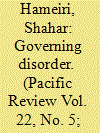

|
|
|
|
|
| Publication |
2009.
|
| Summary/Abstract |
The Australian Federal Police has in recent years become an important actor in both the implementation and design of Australian-led state building interventions in Australia's near region of Southeast Asia and the South Pacific. The article focuses on the recent expansion of the Australian Federal Police as a way of understanding the emergence of a new partly (and strategically) deterritorialized, 'regional' frontier of the Australian state. Within this new frontier, whose fluctuating outlines the Australian Federal Police not only polices but also to a considerable extent shapes and reshapes, as one of the primary expert agencies on identifying and managing transnational security risks, Australian security is portrayed as contingent on the quality of the domestic governance of neighbouring states, thereby creating linkages between the hitherto domestic governing apparatus of the Australian state and those of other countries. This allows for the rearticulation of the problems affecting intervened states and societies - indeed, their very social and political structures - in the depoliticized terms of the breakdown of 'law and order' and the absence of 'good governance', which not only rationalizes emergency interventions to stabilize volatile situations, but also delegitimizes and potentially criminalizes oppositional politics. The Australian Federal Police, however, does more than merely provide justification for intrusive state transformation projects. Its transnational policing activities open up a field of governance within the apparatus of intervened states that exists in separation from international and domestic law. The constitution of such interventions 'within' the state leaves intact the legal distinction between the domestic and international spheres and therefore circumvents the difficult issue of sovereignty. As a result, police and other executive-administrative actors obtain discretionary ordering powers, without dislodging the sovereign governments of intervened countries.
|
|
|
|
|
|
|
|
|
|
|
|
|
|
|
|
| 5 |
ID:
092135
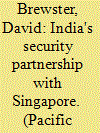

|
|
|
|
|
| Publication |
2009.
|
| Summary/Abstract |
In recent years, India and Singapore have developed a strong bilateral security and economic partnership that has assumed a central position in India's strategic engagement in Southeast Asia. Having sought strategic engagement with India for many decades, Singapore has now successfully positioned itself as India's leading political partner and economic gateway to the region. At the same time, India and Singapore have actively pursued close defence ties, including frequent joint training and the assumption of an active maritime security role by India in Southeast Asia. The recent decision by India to allow the Singapore air force and army to operate long term training facilities on Indian territory represents a significant development in Indian strategic practice and may presage a more permanent Indian security presence in East Asia. This article will examine these developments and consider to what extent the emergent security relationship between India and Singapore should be seen as a desire to balance China's growing economic and political dominance of the region and to what extent it reflects a 'natural' strategic sphere for India stretching from Aden to Singapore and beyond into East Asia.
|
|
|
|
|
|
|
|
|
|
|
|
|
|
|
|
| 6 |
ID:
092134
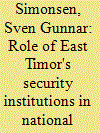

|
|
|
|
|
| Publication |
2009.
|
| Summary/Abstract |
This article examines the interplay between security sector developments and national unity in East Timor since the Indonesian occupation ended in 1999. Particular attention is paid to the regional distinction between Loromonu and Lorosae - people from the west and east of East Timor, respectively. In 2006, East Timor experienced a crisis that saw the disintegration of the military and police forces, and widespread violence that led to massive internal displacement. It was during this crisis that the Loromonu-Lorosae distinction first emerged as a major societal cleavage. The article argues that the independence cause and the guerrilla force Falintil had been an important focus of East Timorese national unity in 1999. In the years that followed, however, the implementation of flawed security policies led to new military and police forces that were politicized, factionalized and lacking in cohesion. Prior to the 2006 crisis, the Loromonu-Lorosae distinction was primarily an issue within the army. As the crisis escalated, however, the violence was to a large extent framed by the east-west dimension, and popular perceptions of the military as 'eastern' and the police as 'western' hardened. A year after the crisis, little if any progress had been made towards reducing the increased salience of the Loromonu-Lorosae distinction in society. The main internal security challenges - gang activity, the unresolved issue of the so-called 'petitioners', and the destabilizing role played by fugitive former head of military police Alfredo Reinado - all had an east-west dimension. The article also finds that new initiatives aimed at reforming East Timor's military and police forces appeared to be lacking in both depth and relevance for addressing the country's new level of internal division, and its immediate, internal security challenges.
|
|
|
|
|
|
|
|
|
|
|
|
|
|
|
|
|
|
|
|
|